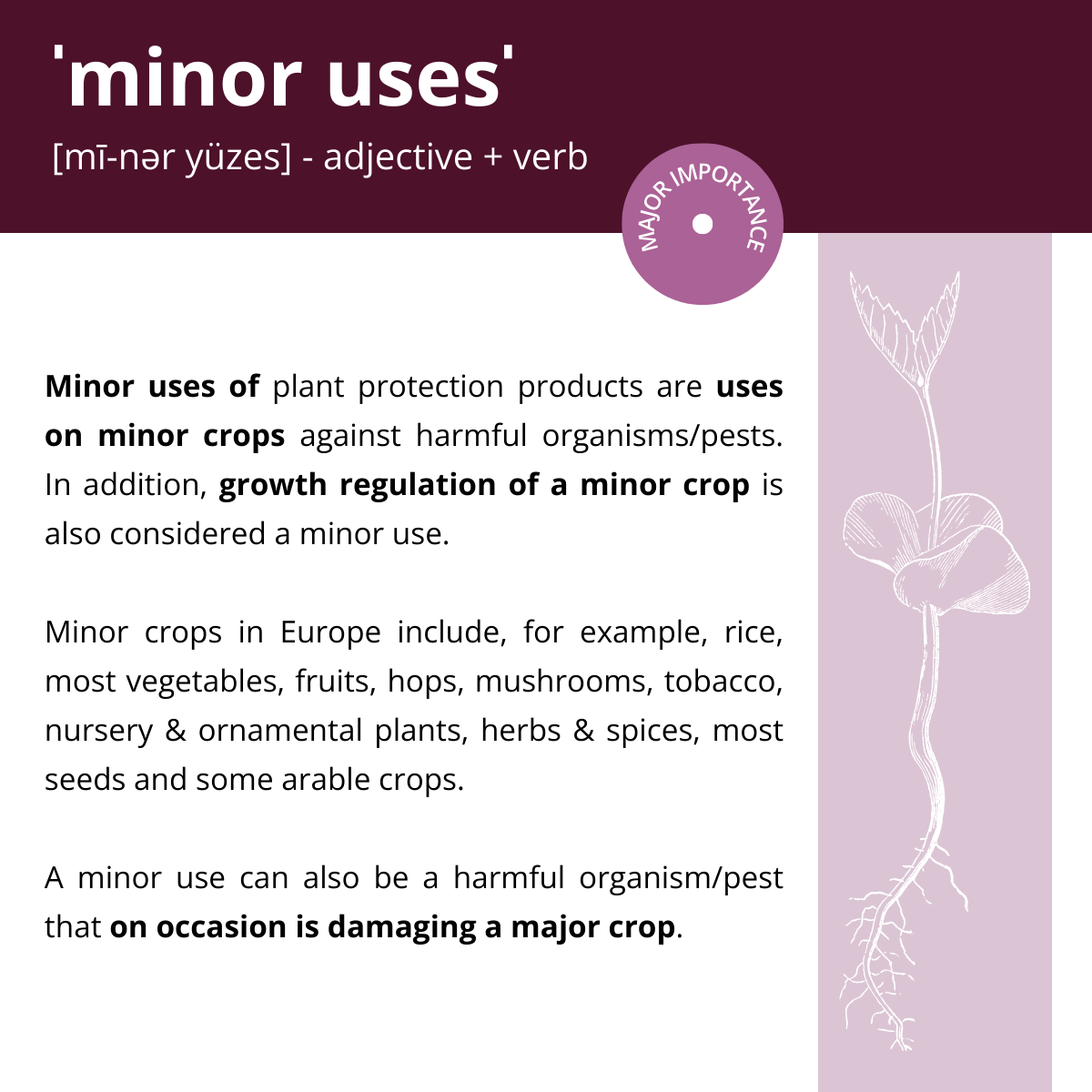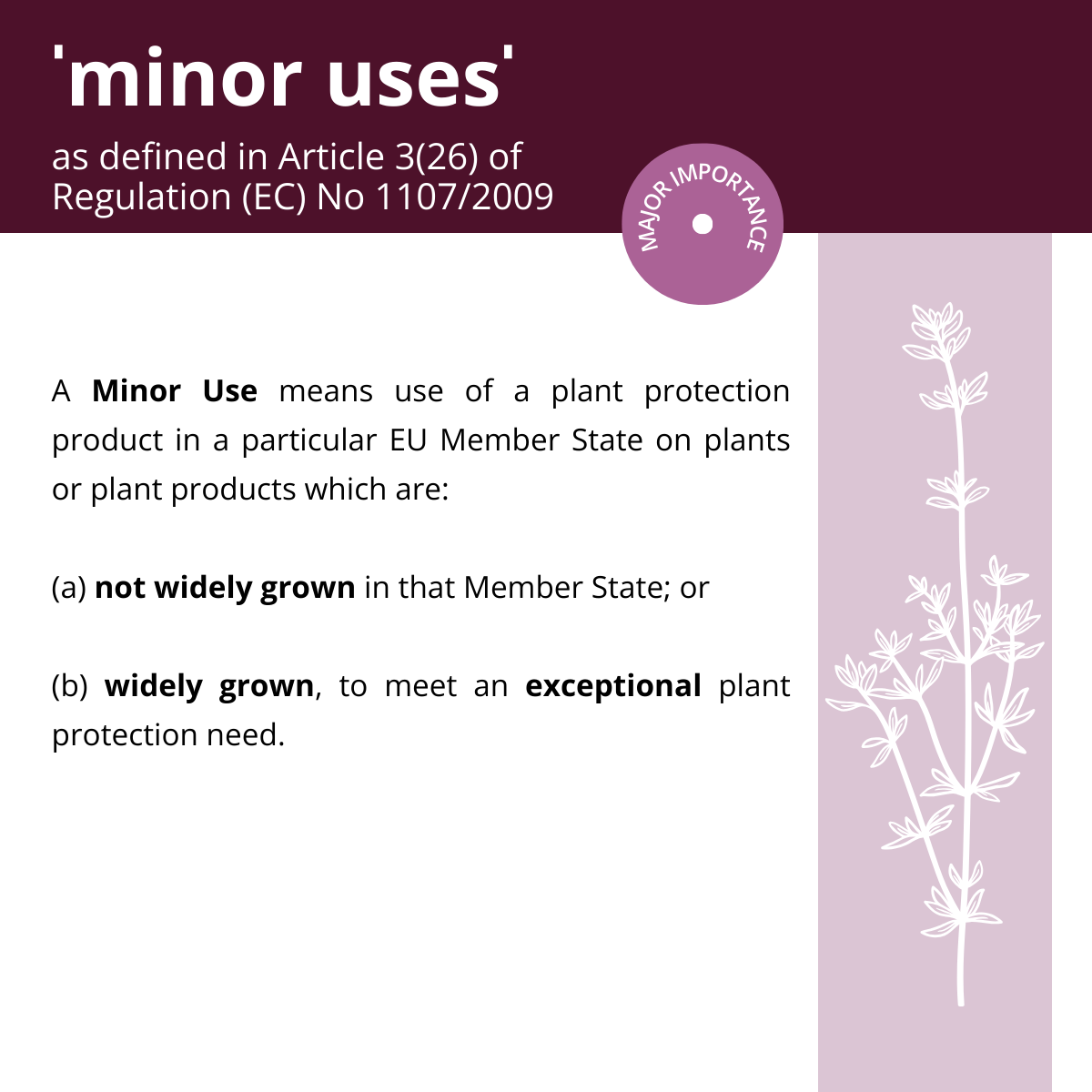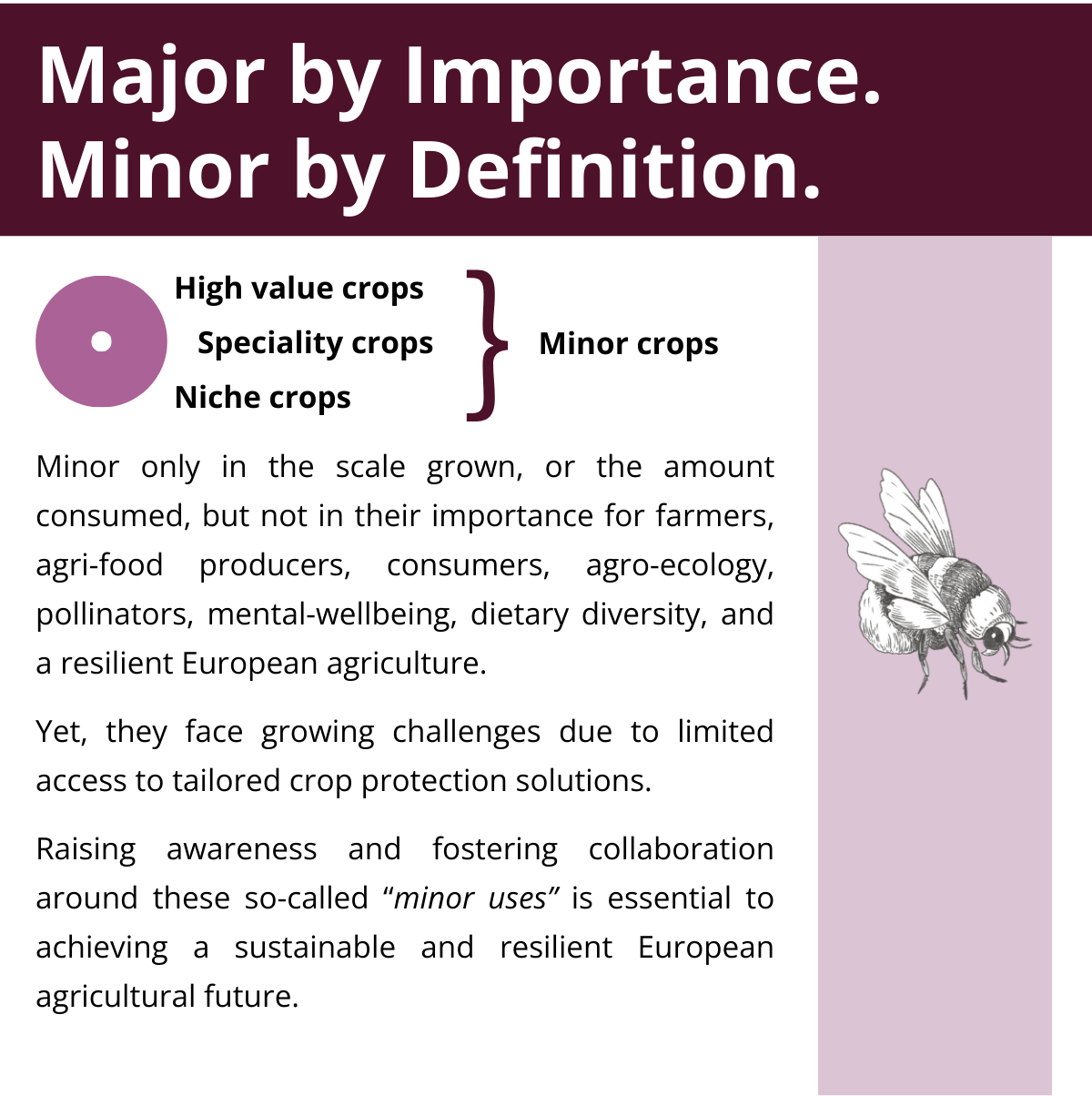Minor crops and minor uses: Definition and Importance
Minor uses of plant protection products are uses on niche, speciality or minor crops (hereafter referred to as ‘minor crops’) which often have a high economic value for farmers, but usually a low economic interest for the agro-pesticide industry.
These minor crops include most vegetables, fruits, nursery plants (e.g. ornamentals, herbs, spices), seed production, tobacco, hops, and some arable crops. It is estimated that overall, these crops are worth more than 60 billion EUR per year, which equates to 20% of the total EU plant production value. A minor use can also be a harmful organism/pest that on occasion is damaging a major crop.
Because of the extensive data packages required for the authorization to market plant protection products, applicants face increasing difficulties in gaining authorization for minor uses.
This leads to a lack of authorized products on the market for farmers to use on these crops which in turn can lead e.g. to:
- Reduction of the yield.
- Increase of the prices of the products for the customers.
- Farmers choosing to no longer grow certain crops.
- Illegal uses of plant protection products.
However, the cultivation of minor crops holds a considerable significance that goes beyond their monetary value:
-
Ecological Resilience: Growing a wide variety of crops, including minor ones, plays a vital role in preserving agrobiodiversity and improving ecological resilience. It could therefore be considered as an ecosystem service, enforcing European food security and the sustainability of European agriculture in the long term.
-
Pollination: Diversified crop production, in particular incorporating minor crops, can result in habitat fragmentation of agricultural landscapes, which can benefit crop/pollination systems.
-
Mental Health: Diverse agricultural landscapes (e.g. greenscapes) and ornamental plants can have positive effects on human health and mental well-being.
-
Dietary Diversity: Cultivating a range of crops also promotes nutritional diversity. Introducing a variety of minor crops (e.g. fruits and vegetables, mushrooms, herbs and spices) with different nutrient profiles can improve overall dietary diversity and contribute to public health.
-
Cultural Importance: Some minor crops possess cultural and traditional importance in European countries. Minor crops are cultivated due to cultural (e.g. saffron in Spain, or Damask rose in Bulgaria) or traditional reasons (e.g. apricot in Austria, or strawberry in Norway) and serve as an integral part of the local food culture and heritage. The preservation and promotion of these crops can aid in maintaining cultural legacy.
-
Climate Resilience: In terms of climate resilience, minor crops production can play a key role in building durable agriculture ecosystems that can better withstand the impacts of climate change. By diversifying crop rotations, incorporating crops with unique growing features and countering monocultural cropping systems, farmers can reduce the likelihood of crop failures and maintain productivity, even under changing environmental conditions.
History and Missions
Due to the manifold importance of minor crops production for Europe and to address minor uses issues in a more coherent way the European Commission (EC) established the European Minor Uses Coordination Facility (MUCF). The Facility started on the 1st of September 2015 and is hosted by the European and Mediterranean Plant Protection Organisation (EPPO) in Paris. Initially, the Coordination Facility was jointly funded by the EC and the governments of France, Germany and the Netherlands. On the 15th of April 2018 the Grant Agreement with the EC expired. Since that date the MUCF is fully funded by voluntary contributions from MUCF Member countries (EU Member States, Norway, the United Kingdom and Switzerland).
-
 The mission of the Facility is to support European stakeholders in closing crop protection gaps in minor uses. It coordinates collaboration and information exchange to improve the availability of sustainable crop protection solutions. The objective is to enable farmers to produce high-quality crops and contribute to sustainable European agriculture.
The mission of the Facility is to support European stakeholders in closing crop protection gaps in minor uses. It coordinates collaboration and information exchange to improve the availability of sustainable crop protection solutions. The objective is to enable farmers to produce high-quality crops and contribute to sustainable European agriculture.
The MUCF liaises with all EU Member States, MUCF Member and Partner countries, growers associations, international minor uses organizations, and other organizations active in the field of minor uses, such as the OECD and IR-4 project. The Coordination Facility stimulates and supports further harmonization e.g. in relation to minor crop status and pest group definition and has developed an Explanatory Note on comprehensive information on minor uses procedures according to Regulation (EC) No. 1107/2009.
The Coordination Facility is maintaining and further developing the European Minor Uses Database (EUMUDA) as a key structure to identify minor uses gaps, and to share information (e.g. minor crop statuses in European countries). The launch of EUMUDA took place on June 28th, 2017.
Recent News
The 23rd Newsletter is now available !
The 23rd Newsletter of the MUCF is now available, featuring the latest updates and activities from the Facility.
In this issue we present recent progress on key initiatives and offer an initial outline of plans for 2026 to strengthen work on minor uses.
Click here to access the 23rd Newsletter of the MUCF.
Disclaimer
Legal Notice: The information on these sites is subject to the following: Websites Terms of Use, Disclaimer, Computer Viruses and Security, Cookies Policy, External links, Copyright notice, Data protection and other Conditions.
The MUCF maintains these Websites to provide public access to information about its initiatives, activities, and functions. While the MUCF strives to keep the information timely and accurate, errors may occur. If errors are brought to the attention of the MUCF, the MUCF will attempt to correct them promptly. However, the MUCF assumes no responsibility or liability regarding the information provided on these sites. The MUCF is committed to promoting open data practices to improve data access, derive additional value from data assets, and maximize data use. To ensure wide dissemination of its information, the MUCF is committed to making its content freely available, with a limited amount of “members only sections” and encourages the use, reproduction and dissemination of the Information, while maintaining and respecting MUCFs copyright rights.
Click here to read more or click on button bellow to download the entire document.














